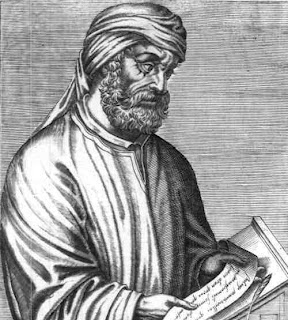source document: Tertullian
 Tertullian (ca.160 – ca.220 AD) is a fascinating church father. His writings include the first use of "trinity" and "three persons, one substance," phrases which gained special significance for the church. A scholarly man, he addressed heresies but he himself was later considered a heretic. The disdain drips from this passage in The Prescription Against Heretics:
Tertullian (ca.160 – ca.220 AD) is a fascinating church father. His writings include the first use of "trinity" and "three persons, one substance," phrases which gained special significance for the church. A scholarly man, he addressed heresies but he himself was later considered a heretic. The disdain drips from this passage in The Prescription Against Heretics:"VII. PAGAN PHILOSOPHY THE PARENT OF Heresies. The Connection Between Deflections from Christian Faith and the Old Systems of Pagan Philosophy.
It is this philosophy which is the subject matter of this world's wisdom, that rash interpreter of the divine nature and order. In fact, heresies are themselves prompted by philosophy. It is the source of "aeons" and I know not what infinite "forms" and the "trinity of man" in the system of Valentinus. He was a Platonist. It is the source of Marcion's "better God", better because he has his tranquility. Marcion came from the stoics. Again, when it is said that the sould perishesm that opinion is taken fromt he epicureans, The denial of the restoration of the flesh is taken from the universal teaching of the philosophers; the equation of matter with God is the doctrine of Zeno; and when any assertion is made about a God of fire, the Heraclitus comes in. Heretics and philosophers handle the same subject matter; both treat the same topics - "Whence came evil? "And why?" Whence came man? And how? ....What is there in common between athens and Jerusalem? What between the Academy and the Church? What between heretics and Christians?...away with all projects for a "Stoic," a "platonic," or a "dialectic" Christianity. After Christ Jesus we desire no subtle theories, no acute enquiries after the Gospel..."
There's a lot to appreciate about the section: the fact that the philosopher's questions are still our questions today; the famous "What has Jerusalem to do with Athens?" quote, etc. I am also fond of how adamant he is that Christians not be held captive by the teachings and assumptions of their surroundings - I think Barth must have liked that. But my favorite aspect is that he calls out a murderer's row of heretic philosophers!
The lady doth protest too much, methinks.


Comments
Post a Comment
I cherish your comments, but not vileness or wickedness. By vileness I mean Spam, and wickedness I mean hateful speech. Unless it's about spam.